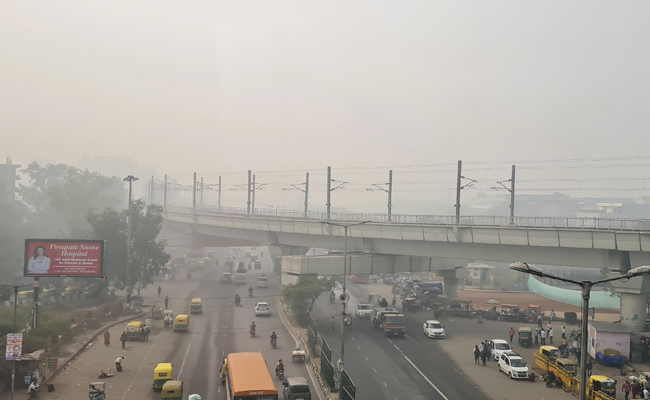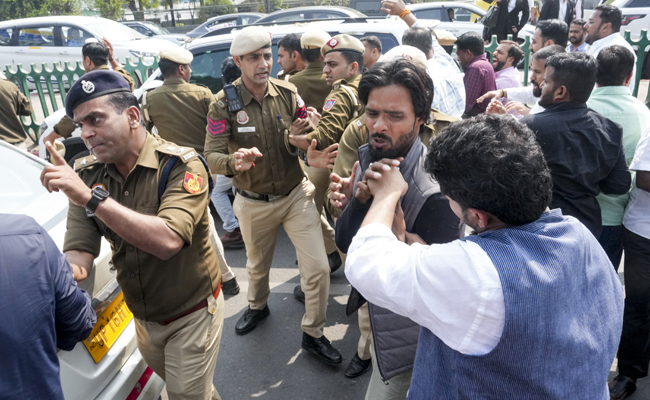New Delhi (PTI): The air quality in Delhi was recorded in the 'severe' category on Thursday morning, with a marginal improvement expected just ahead of Diwali as meteorological conditions are likely to become slightly favourable.
The city's Air Quality Index (AQI) stood at 420 at 8 am on Thursday, compared to 426 at 4 pm on Wednesday. The AQI map prepared by the Central Pollution Control Board showed clusters of red dots (indicating hazardous air quality) spread across the Indo-Gangetic plains.
Neighbouring Ghaziabad (369), Gurugram (396), Noida (394), Greater Noida (450), and Faridabad (413) also reported very bad air quality.
According to officials at the India Meteorological Department, a change in wind direction from northwest to southeast due to a fresh western disturbance affecting northwest India will help reduce the contribution of smoke from stubble burning, but slow wind speed will counteract this.
However, once the western disturbance passes, the wind speed will increase from around 5-6 kmph, at present, to around 15 kmph on November 11, which will help disperse pollutants ahead of Diwali, the official said.
According to data from the Decision Support System, a numerical model-based framework capable of identifying sources of particulate matter pollution in Delhi, stubble burning in neighbouring states, particularly Punjab and Haryana, accounted for 38 per cent of the air pollution in Delhi on Wednesday. It is likely to be 27 per cent on Thursday and 12 per cent on Friday.
The data also shows that transport is another major factor, contributing 12 to 14 per cent to Delhi's foul air.
In view of the worsening air pollution, the Delhi government on Wednesday rescheduled the December winter break of all schools, which will now be from November 9 to November 18.
Delhi Environment Minister Gopal Rai said the entry of app-based taxis into Delhi has been banned according to orders of the Supreme Court.
He also said the odd-even car rationing scheme will be implemented in the national capital after the Supreme Court reviews its effectiveness and issues an order. The matter will be next heard on Friday.
On Tuesday, the apex court questioned the effectiveness of the Delhi government's car rationing scheme, aimed at curbing vehicular pollution, and referred to it as "all optics".
Anticipating further deterioration of air quality post-Diwali, Rai had on Monday announced that the flagship scheme, which permits cars to operate on alternate days based on the odd or even last digit of their registration numbers, would be enforced between November 13 and November 20.
According to the Ministry of Earth Sciences' Air Quality Early Warning System for Delhi-NCR, the region is likely to experience "very poor" to "severe" air quality for another five to six days.
Doctors say breathing in the polluted air of Delhi is equivalent to the harmful effects of smoking approximately 10 cigarettes a day.
Prolonged exposure to high levels of pollution can cause or exacerbate respiratory problems such as asthma, bronchitis and chronic obstructive pulmonary disease (COPD) and dramatically raise the risk of cardiovascular disease, said Rajesh Chawla, senior consultant in pulmonology and critical care at the Indraprastha Apollo Hospital.
Stringent restrictions mandated under the final stage of the central government's air pollution control plan for Delhi-NCR, Graded Response Action Plan (GRAP), have also been implemented in the national capital.
The restrictions under Stage IV of GRAP, including a ban on all kinds of construction work and the entry of polluting trucks into Delhi, took effect on Sunday after the air quality in the city dropped to 'severe plus' (AQI above 450) levels.
GRAP categorises actions into four stages: Stage I - Poor (AQI 201-300); Stage II - Very Poor (AQI 301-400); Stage III - Severe (AQI 401-450); and Stage IV - Severe Plus (AQI above 450).
Unfavourable meteorological conditions, combined with vehicular emissions, paddy straw burning, firecrackers and other local pollution sources contribute to hazardous air quality levels in Delhi-NCR during the winter every year.
According to a Delhi Pollution Control Committee analysis, the capital experiences peak pollution from November 1 to November 15 when the number of stubble burning incidents in Punjab and Haryana increases.
The air quality in Delhi-NCR declined over the last two weeks due to a gradual drop in temperatures, calm winds that trap pollution and a surge in paddy straw burning across Punjab and Haryana.
Delhi's air quality ranks among the worst in the world's capital cities.
A report by the Energy Policy Institute at the University of Chicago (EPIC) in August said that air pollution is shortening lives by almost 12 years in Delhi.
Let the Truth be known. If you read VB and like VB, please be a VB Supporter and Help us deliver the Truth to one and all.
Mayabunder: A Pawan Hans helicopter crashed into the sea near Mayabunder in the Andaman and Nicobar Islands on Tuesday morning.
The helicopter went down about two kilometres away from the helipad at around 9:45 am. All persons on board are reported safe.
The cause of the incident is not immediately known, and further details are awaited.
Pawan Hans officials said necessary protocols were initiated following the incident.





